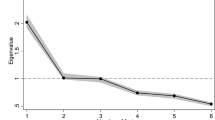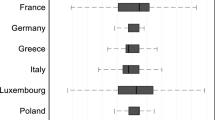Abstract
Given the importance of the household as a resource allocation mechanism, considerable interest exists in its efficiency. Most of the non-experimental evidence for inefficiency comes from West African farm households in which husbands and wives pursue separate productive activities. Using experiments, we test for efficiency of spouses’ resource allocation decisions in a range of household types. In North India, we select households that are unified, in northern Nigeria households characterised by separate spheres of economic decision-making. Our other sites occupy carefully selected intermediate positions on the spectrum from unitary to separate-spheres household types. We find that, the more separate the decision-making in real life, the less efficient the resource allocation in the experiments. Moreover, female control of resource allocation tends to lower efficiency, in contrast to male control. The exception is a site in northern Nigeria where female control of resource allocation is well established.
Résumé
Étant donné l’importance du “ménage” en tant que mécanisme d’allocation des ressources, son efficacité suscite un intérêt considérable. La plupart des preuves non expérimentales de son inefficacité proviennent de ménages agricoles d'Afrique de l'Ouest dans lesquels les maris et les femmes exercent des activités productives distinctes. À l'aide d'expérimentations, nous testons l'efficacité des décisions d'allocation de ressources des conjoints dans divers types de ménages. En Inde du Nord, nous avons sélectionné des ménages unitaires, et dans le nord du Nigéria, des ménages caractérisés par des sphères de décision économique distinctes. Nos autres sites occupent des positions intermédiaires soigneusement sélectionnées sur le spectre allant du ménage unitaire au ménage distinct. Nous constatons que plus la prise de décision est séparée dans la vie réelle, moins l'allocation de ressources est efficace dans le cadre de l’expérimentation. De plus, un contrôle de l'allocation des ressources par les femmes a tendance à réduire l'efficacité du ménage, contrairement à un contrôle par les hommes. Une exception a été trouvée dans un site du nord du Nigéria, où le contrôle de l'allocation des ressources par les femmes est bien établi.

Similar content being viewed by others
Notes
The Maguzawa sample was smaller than originally intended; we decided to scrap some treatments not considered in the paper, and allocated a residue of 5 couples to the base version.
The results of using OLS and ordered probit are available from the authors. These results lead to the same conclusions as the tobit models about which treatment effects are robust, commented on above. They also lead to the same conclusions about statistical significance of site dummies, expectations of the other spouse’s contributions and socio-economic correlates of contribution behaviour, commented on next.
References
Abdulwahid, Saratu. 2006. Gender Differences in Mobilization for Collective Action: Case Studies of Villages in Northern Nigeria, Capri Working Papers No 58.
Akresh, Richard. 2008. Efficiency in Intrahousehold Allocations. Mimeo: Department of Economics, University of Illinois, Urbana-Champaign.
Alesina, Alberto, Paola Giuliano, and Nathan Nunn. 2011. The Origins of Gender Roles: Women and the Plough. American Economic Review 101 (3): 499–503.
Apps, Patricia, and Ray Rees. 1988. Taxation and the Household. Journal of Public Economics 35 (3): 355–369.
Apps, Patricia, and Ray Rees. 2009. Public Economics and the Household. Cambridge: Cambridge University Press.
Ashraf, Nava. 2009. Spousal Control and Intra-Household Decision Making: An Experimental Study in the Philippines. American Economic Review 99 (4): 1245–1277.
Basu, K. 2006. Gender and Say: A Model of Household Behaviour with Endogenously Determined Balance of Power. Economic Journal 116 (511): 558–580.
Becker, G. 1974. A Theory of Marriage: Part ii. Journal of Political Economy 82 (2): 11–26.
Boserup, Ester. 1970. Woman’s Role in Economic Development. London: George Allen and Unwin.
Chiappori, P. 1988. Rational Household Labor Supply. Econometrica 56 (1): 63–90.
Chiappori, P. 1992. Collective Labor Supply and Welfare. Journal of Political Economy 100 (3): 437–467.
Clough, Paul. 2009. ‘The impact of rural political economy on gender relations in Islamizing Hausaland, Nigeria. Africa: The Journal of the International African Institute 79 (4): 595–613.
Duflo, Esther and Christopher R. Udry. 2004. ‘Intrahousehold Resource Allocation in Côte d’Ivoire: Social Norms, Separate Accounts and Consumption Choices,’ NBER Working Papers 10498, National Bureau of Economic Research, Inc.
Dyson, Tim, and Mick Moore. 1983. On Kinship Structure, Female Autonomy, and Demographic Behavior in India. Population and Development Review 9 (1): 35–60.
Frank, Emily. 1999. ‘Gender, Agricultural Development and Food Security in Amhara, Ethiopia: The Contested Identity of Women Farmers in Ethiopia’, mimeo, USAID/Ethiopia.
Greenberg, Joseph. 1946. The Influence of Islam on a Sudanese Religion (Monographs of the American Ethnological Society). New York: J. J. Augustin.
Hill, Polly. 1969. Hidden Trade in Hausaland. Man 4 (3): 392–409.
Hill, Polly. 1972. Rural Hausa: a Village and a Setting. Cambridge: Cambridge University Press.
Hill, Polly. 1975. The West African Farming Household. In Changing Social Structure in Ghana, ed. Jack Goody, 119–136. London: International African Institute.
Hoel, Jessica B. 2015. Heterogeneous Households: A Within-subject Test of Asymmetric Information between Spouses in Kenya. Journal of Economic Behavior & Organization 118: 123–135.
Iversen, Vegard, Cecile Jackson, Bereket Kebede, Alistair Munro, and Arjan Verschoor. 2011. Do Spouses Realise Cooperative Gains? Experimental Evidence from Rural Uganda. World Development 39 (4): 569–578.
Jackson, Cecile. 1978. Hausa Women on Strike. Review of African Political Economy 13: 21–36.
Jackson, Cecile. 2013. Cooperative Conflicts and Gender Relations: Experimental Evidence from Southeast Uganda. Feminist Economics 19 (4): 25–47.
Jejeebhoy, Shireen J. 2001. Women’s Autonomy in Rural India: Its Dimensions, Determinants, and the Influence of Context. In Women’s Empowerment and Demographic Processes: Moving Beyond Cairo, ed. Harriet B. Presser and Gita Sen. New York: Oxford University Press.
Jejeebhoy, Shireen J., and Zeba A. Sathar. 2001. Women’s Autonomy in India and Pakistan: The Influence of Religion and Region. Population and Development Review 27 (4): 687–712.
Jones, Christine. 1983. The Mobilization of Women’s Labor for Cash Crop Production: A Game Theoretic Approach. American Journal of Agricultural Economics 65 (5): 1049–1054.
Kebede, Bereket, Marcela Tarazona, Alistair Munro, and Arjan Verschoor. 2014. Intra-household Efficiency: An Experimental Study from Ethiopia. Journal of African Economies 23 (1): 105–150.
Lechene, Valérie, and Ian Preston. 2011. Noncooperative Household Demand. Journal of Economic Theory 146 (2): 504–527.
Lundberg, S., and R.A. Pollak. 2003. Efficiency in Marriage. Review of Economics of the Household 1 (3): 153–167.
Mani, Anandi. 2011. ‘Mine, Yours or Ours? The Efficiency of Household Investment Decisions: An Experimental Approach,’ University of Warwick: mimeo.
Manser, M., and M. Brown. 1980. Marriage and Household Decision-making: A Bargaining Analysis. International Economic Review 21 (1): 31–44.
McElroy, M., and M. Horney. 1981. Nash-bargained Household Decisions: Toward a Generalization of the Theory of Demand. International Economic Review 22 (2): 333–349.
Munro, Alistair. 2018. Intra-household Experiments: A Survey. Journal of Economic Surveys 32 (1): 134–175.
Munro, Alistair, Bereket Kebede, Marcela Tarazona-Gomez, and Arjan Verschoor. 2014. Autonomy and efficiency: An experiment on household decisions in two regions of India. Journal of the Japanese and International Economies 33: 114–133.
Munro, Alistair, Bereket Kebede, Marcela Tarazona and Arjan Verschoor. 2019. The Lion's Share: An Experimental Analysis of Polygamy in Northern Nigeria. Economic Development and Cultural Change forthcoming.
Pittin, Renée Ilene. 2002. Women and Work in Northern Nigeria: Transcending Boundaries. Basingstoke, UK: Palgrave Macmillan.
Rahan, Lupin, and Vijayendra Rao. 2004. The Determinants of Gender Equity in India: Examining Dyson and Moore’s Thesis with New Data. Population and Development Review 30 (2): 239–268.
Schildkrout, Enid. 1982. ‘Dependence and Autonomy: The Economic Activities of Secluded Hausa Women in Kano, Nigeria’, in Women and Work in Africa, ed. Edna Bay, pp. 55–81 (Boulder, CO, Westview Press), pp. 55–81.
Seebens, Holger, and Johannes Sauer. 2007. Bargaining Power and Efficiency – Rural Households in Ethiopia. Journal of International Development 19: 895–918.
Tambiah, Stanley J. 1989. Bridewealth and Dowry Revisited. Current Anthropology 30 (4): 413–435.
Udry, Christopher R. 1996. Gender, Agricultural Production, and the Theory of the Household. Journal of Political Economy 104 (5): 1010–1046.
Ulph, D. 1988. ‘A General Non-cooperative Nash Model of Household Consumption Behaviour,’ University of Bristol, Discussion Paper No. 88/205.
Woolley, F. 1988. ‘A Non-cooperative Model of Family Decision Making,’ London School of Economics, Discussion Paper TIDI/125.
Acknowledgments
We thank Cecile Jackson, Andreas Kutka, Dominique Lussier and Nitya Rao for comments and for help in identifying literature to guide our site selection; for institutional support for the fieldwork, Dr Assefa Admassie, Director of the Ethiopian Economics Association, Prof. Amaresh Dubey, Jawaharlal Nehru University, New Delhi and Dr Haruna Wakilli, Director of Mammbayya House, Centre for Democratic Research & Training, Kano, Nigeria; for organising and implementing data collection, our fieldwork manager, Matthew Osborne, supervisors Dr Andreia Miraldo (Ethiopia and Nigeria), Dr Joe Hill (Ethiopia), Kabiru Bello (Nigeria), Dr Biswarupa Gosh, Dr Pradip K. Sen, and Dr Anup K. Mishra (Uttar Pradesh), Dr R. Naagarajan (Tamil Nadu) and all local research assistants; for helpful comments, participants in seminars at the Chief Economist’s Office at the Department for International Development (DFID), UK and in a CBESS/BEDERG seminar at the University of East Anglia, UK; for the joint grant (RES-167-25-0251), UK’s ESRC and DFID.
Author information
Authors and Affiliations
Corresponding author
Ethics declarations
Conflict of Interest
On behalf of all authors, the corresponding author states that there are no conflicts of interest.
Additional information
Publisher's Note
Springer Nature remains neutral with regard to jurisdictional claims in published maps and institutional affiliations.
Electronic Supplementary Material
Below is the link to the electronic supplementary material.
Rights and permissions
About this article
Cite this article
Verschoor, A., Kebede, B., Munro, A. et al. Spousal Control and Efficiency of Intra-household Decision-Making: Experiments among Married Couples in India, Ethiopia and Nigeria. Eur J Dev Res 31, 1171–1196 (2019). https://doi.org/10.1057/s41287-019-00206-6
Published:
Issue Date:
DOI: https://doi.org/10.1057/s41287-019-00206-6




